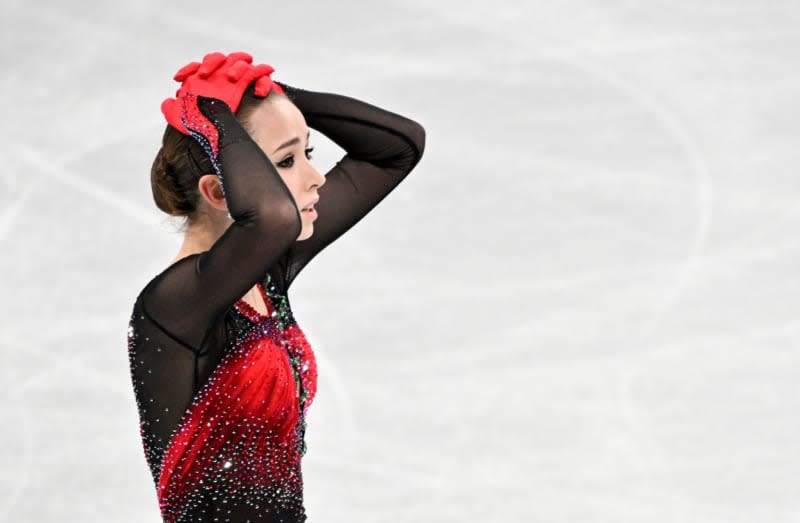CAS bans skater Valieva for four years as Russia lose Olympic gold

- Oops!Something went wrong.Please try again later.
- Oops!Something went wrong.Please try again later.
Teen-aged Russian figure skater Kamila Valieva has been banned for four years for a doping offence and Russia has been stripped of the 2022 Olympic team event gold medal as a result, the Court of Arbitration for Sport (CAS) said on Monday.
Then 15, Valieva helped Russia win the team gold at the Beijing Games two years ago with a stunning performance.
But the medal ceremony never took place as it emerged right afterwards that she had tested positive for the banned substance trimetazidine on December 25, 2021, at the Russian championships.
Valieva was later cleared by a Russian anti-doping tribunal but that ruling was contested by the World Anti-Doping Agency (WADA) and the ruling skating body ISU who asked the CAS to impose a four-year ban and disqualification from all events after the positive test.
This was granted by the CAS after a long process, with Valieva banned from December 25, 2021, for four years.
The team event gold is now set to go to the United States who originally came second, ahead of Japan and Canada. The allocation is a matter for the International Olympic Committee to decide.
WADA welcomed the CAS ruling, saying in a statement it brought the case before the CAS "in the interests of fairness for athletes and clean sport and we believe that has been delivered through this decision."
In Russia, the domestic skating body announced a thorough look into the verdict, and Kremlin spokesman Dmitry Peskov was quoted by state news agency TASS as saying "of course, we do not agree with this" ruling.
Peskov spoke of "a politicized decision" and said that an appeal may be launched.
"If there are any mechanisms of appeal and so on, they should certainly be invoked. We must protect the interests of our athletes to the end," Peskov told TASS.
Valieva and her legal team have the right to appeal the CAS ruling at the Swiss supreme court, but only on procedural grounds.
The case made big waves at the Beijing Games where a CAS ad hoc panel had allowed her to continue competing in the individual event despite the positive test.
Valieva led after the short programme but an error-filled free skate saw her drop to fourth.
Later in 2022 the disciplinary anti-doping commission (DADC) of Russia's anti doping agency RUSADA ruled that Valieva bore “no fault or negligence” and only disqualified her from the Russian championships.
This ruling was contested by WADA, the ISU and RUSADA itself, before the highest sports court CAS where hearings took place last year in September and November behind closed doors.
WADA wanted a four-year ban starting December 2021 and disqualification from all her subsequent events including the Olympics. ISU also sought a four-year ban, but at least two years, and also disqualification from all events.
RUSADA wanted Valieva sanctioned for a doping offence with “the appropriate consequences" under its rules which could be limited to a reprimand.
Valieva and her legal team say that CAS has no jurisdiction over the WADA, ISU and RUSADA claims and wants to be reinstated into the Russian championships results. Alternatively, they want CAS to agree she bore "no fault or negligence" and ban her for a maximum two years, without disqualifying her from events including the Olympics.
Monday's ruling said that "Ms Valieva was not able to establish, on the balance of probabilities and on the basis of the evidence before the Panel, that she had not committed the ADRV [Anti-Doping Rule Violation] intentionally" within Russian anti-doping rules.
It said that under Russian rules it made no difference whether the athlete was an adult or a protected person as a minor and “no basis under the rules to treat them [minors] any differently from an adult athlete.
"Accordingly, since it was determined that there was no scope for the exercise of discretion to reduce the period of ineligibility, a four-year period of ineligibility was imposed by the Panel," the CAS said.
WADA said: "The doping of children is unforgivable. Doctors, coaches or other support personnel who are found to have provided performance-enhancing substances to minors should face the full force of the World Anti-Doping Code.
"Indeed, WADA encourages governments to consider passing legislation – as some have done already – making the doping of minors a criminal offence."
Valieva has not competed internationally since the Beijing Games, with Russian skaters banned since the start of the country's invasion of Ukraine a few days after the closing ceremony in February 2022.
Her ban runs until December 2025, a few weeks before the next Winter Olympics in Milan/Cortina d'Ampezzo, Italy.

